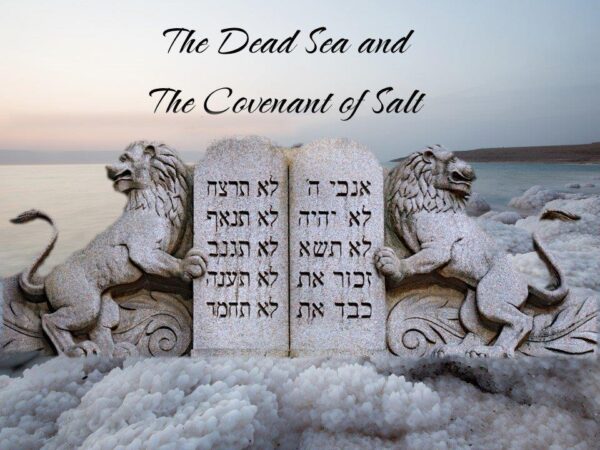I am looking forward to our next trip to Israel in June, and one highlight would be my first sighting of the Dead Sea. As soon as one leaves Jerusalem, there it is, so beautiful, so majestic, and yet, it is dead. And one reason why it was called dead, or as modern Israelis call it, the Sea of Death, Yam-ha-mavet, is because of its high salt content which does not allow any aquatic organism such as fish or plants to survive, even though there are some minuscule quantities of bacteria present.
But another reason why it is called dead, is because it receives water but does not give back any. It takes from the Jordan River, but keeps it all for itself, and so it is dead even though it is of great beauty from the outside. This is similar to those who receive and are not giving, or sharing, or serving. We want our service to be filled with living fruit, which nourishes and encourages others. We have read in Scripture what is said: “Salt is good; but if the salt becomes unsalty, with what will you make it salty again? Have salt in yourselves, and be at peace with one another.” Just before, Yeshua spoke of the worm that never dies to illustrate the never ending state of hell, but now He mentions the remedy; salt.
What is the relation between the two? Did you know that in nature, salt kills worms. If one sprinkles salt on a worm, the salt will absorb all the water from the worm which will become dehydrated and finally dies. This process is called osmosis.
What then is this salt which is the remedy against that worm? Salt is a preservative, a protection against what decays. From ancient times, it was used for the preservation of food, and here Yeshua uses it as a symbol of the preservation of our souls in God against hell. This is why salt is good. For everyone will be salted with fire. We can think of the concept of common grace where everyone will be given a chance to attain salvation; everyone will be salted with the fire of cleansing and given the ability to make a decision. But this is not available forever. This is why there is always an urgency when it come to make that decision to follow Yeshua.
And Yeshua adds: If the salt become unsalty, with what will you make it salty again? Salt in its natural state, never decays. It is what it is mixed with that can corrupt it until it becomes unsalty.
Unsalty means that it does not have all those characteristics associated with salt, such as preservation, and protection against decay. This is when the pure Word of God is mixed with many impurities of this world such as false teaching. These will dilute it to the point that it becomes unrecognizable and unreliable for the work of the Kingdom of God. Only being and staying close to Yeshua will distill the impurities, cleansing the individual so that he or she may love and be at peace with others, once again.
Reading all these powerful illustrations, we can now really appreciate what the Lord describes us as, when He says to each of us believers, you are the salt of the earth. In which way are we the salt of the earth? In the Hebrew Bible we read of the Salt of the Covenant of God. This covenant is found right in the opening of the Book of Leviticus, when God ordered that all the sacrifices should be salted. And it is through this covenant where we can really understand the fact that we are the salt of the earth.
There are two passages in the Hebrew Bible which explain the nature of God’s promises through salt. One has to do with the priestly covenant and the other with the Davidic covenant. Both speak of the surety of the coming of Yeshua as a Priest and as a King. This is where it meets us with our proclamation of the Good News.
The first is found in Numbers 18:19, speaking of the priesthood in Israel, of their duties and position in the nation. God says, “All the offerings of the holy gifts, which the sons of Israel offer to the LORD…It is an everlasting covenant of salt before the LORD to you and your descendants with you.” This was God’s promise that the priesthood will never end, for we always need a Mediator between God and man, and the eternal priestly order is called by David and by the author of Hebrews, the priesthood according to the order of Melchizedek.
The other place where God’s Covenant of Salt is mentioned is in 2Chronicles 13:5. There we read, “Do you not know that the LORD God of Israel gave the rule over Israel forever to David and his sons by a covenant of salt? The Davidic Covenant and the promise of an eternal king descending from David was understood to be a covenant of salt, an eternal covenant, according to God’s promise which will be fulfilled by Yeshua at His Second Coming.
And so, for the Israelite and for us today, the Covenant of Salt reminds us of the eternal promises of a priesthood and kingship in Israel which today we know the first is now fulfilled by Yeshua. The second will be when He comes back as King of kings. Knowing all these things, the conclusion for now is; be at peace with one another for He is coming very soon. These are the last words of Yeshua’s argument in Mark 9.
